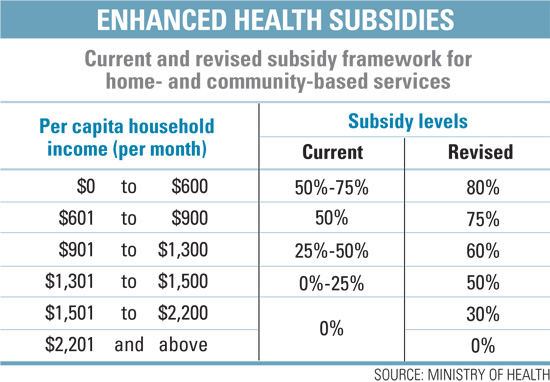2 in 3 households to benefit from more health subsidies


Caring for the needs of her bedridden elderly mother puts a strain on Ms Lye Kuen, 65, who is the former's primary caregiver at home.
Her 90-year-old mother, who lives with her in a Pasir Ris executive flat, suffers from Parkinson's disease. Ms Lye, a retiree, spends an average of $700 monthly on her mother's medication and other expenses.
She said: "Any help is good, so I won't need to use up so much of my savings."
Things will soon get better for Ms Lye, who is currently receiving $100 a month from the Government's assistance scheme for the disabled elderly.
Under the revised Interim Disability Assistance Programme For The Elderly, she stands to get a larger monthly cash payout of $250.
The revision was announced by the Ministry of Health (MOH) yesterday, as part of a series of enhancements to promote more affordable intermediate and long-term care services at community hospitals, nursing homes and at home.
With changes to subsidies, around two thirds of Singaporean households - covering about 80 per cent of the elderly here - will benefit from some form of financial assistance. The measures are set to take effect by the third quarter of this year.
MOH will also raise qualifying income ceilings, to expand its reach to cover more middle- income households.
Middle-income households will see the highest increase in subsidies of up to 50 percentage points, for instance, for home- and community-based services (see table).

These services, which include home care and day-rehabilitation centres, will see the qualifying per capita monthly income for subsidies raised from $1,400 to $2,200. This will also apply for subsidies for residential long-term care services, such as nursing homes and inpatient hospices.
Subsidised patients who require intermediate and long- term care services will not have to pay the 7 per cent goods and services tax for services under the charge of MOH or the Ministry of Community Development, Youth and Sports (MCYS).
MOH and MCYS will spend $250 million annually, which is about $60 million more, towards the care of some 40,000 elderly.
Said Dr Angel Lee, medical director of Dover Park Hospice: "The enhancements will allow us to channel our limited resources, which were formerly expended on subsidising patients' fees, to reach out to more patients."

For more my paper stories click here.